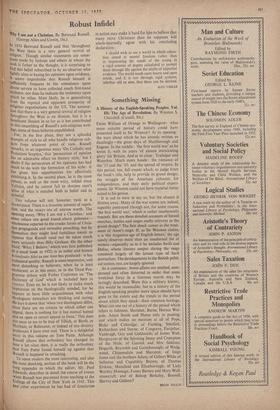• . Something Missing
A History of the English-Speaking Peoples. Vol. III: The Age of Revolution. By Winston S. Churchill. (Cassell, 30s.) FROM William of Orange to Wellington : what more suitable period of history could have presented itself to Sir Winston? At its opening : the wars about which he has already written so dazzlingly—the great days of Marlborough and Eugene. In the middle : 'the first world war' as he terms it, with its years 'of almost intoxicating glory' for Britain. And at its close : Trafalgar and Waterloo. Much more beside: the romance of the '15 and the '45; and the spread of -empire. In this period, too, fall events which, to judge from the book's title, help to provide its grand design; the struggle of the American colonists, for independence, and their early political experi- ments. Sir Winston could not have material better suited to his genius.
It is sad to have to say so, but the chance is thrown away. Many of the war scenes are, indeed, superbly portrayed (though not, for some reason, 'the first world war,' which is rather incoherently treated). But are these detailed accounts of forced marches, battles and sieges really relevant to the grand design? The first shock comes in the treat- ment of Anne's reign. If, as Sir Winston claims, it is 'the Augustan age of English letters,' the age surely deserves more than an unadorned list of writers—especially as in it he includes Swift and Defoe, whose literary output during the reign consisted largely of the lowest type of hack journalism. The developments in the British politi- cal system, too, are largely ignored.
So it continues : home affairs are omitted, com- pressed and often distorted in order that some wretched foray in a German marsh may be lovingly described. Were this a military history, this would be reasonable; but in a history of the English-speaking peoples more space should have gone to the events and the trends in the period about which they speak—their common heritage. What can one say of a history of the period which refers to Johnson, Sheridan, Burns, Horace Wal- pole, Adam Smith and Hume only in passing; and which makes no mention at all of Pope, Blake and Coleridge; of Fielding, Smollett, Richardson and Sterne; of Congreve, Farquhar, Vanbrugh, Gay and Goldsmith; of James Watt, Hargreaves of the Spinning Jenny and Crompton of the Mule; of Garrick and Mrs. Siddons; Hogarth, Reynolds and Gainsborough; of Wedg- wood, Chippendale and Sheraton; of Inigo Jones and the brothers Adam; of Gilbert White of Selborne and Capability Brown; of Thomas Erskine, Mansfield and Ellenborough; of Lady Wortley Montagu, Fanny Burney and Mary Woll- stonecraft; and of Bishop Berkeley, Boswell, Hervey and Gibbon?
BRIAN INGLIS


































 Previous page
Previous page